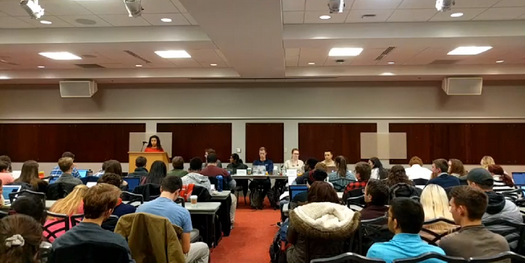
Ohio State University Student Leaders Reject BDS for Fifth Time
by Shiri Moshe – Algemeiner Journal
Student leaders at Ohio State University on Wednesday overwhelmingly rejected a resolution endorsing the boycott, divestment, and sanctions (BDS) campaign against Israel.
With a vote of seven in favor and 33 against, OSU’s Undergraduate Student Government (USG) struck down legislation brought forward last month by the OSU Coalition for BDS — marking the fifth time anti-Israel divestment resolutions were defeated at the school in recent years.
The measure called for OSU to divest from companies accused of benefiting “from the Israeli occupation of Palestine,” and to boycott Israeli universities and academics, including “currently invited speakers and visiting professors.”
It faced opposition from Protect OSU, a coalition of students who argued that the proposal engaged in “hate speech against Israel,” would “divide our community,” and “could keep jobs, internships, and investments from OSU.” Among the group’s leaders was Buckeyes for Israel President Maya Rosenberg, who opened the debate on Wednesday evening by saying that the resolution had the potential to “completely shut out one side of the conversation, eliminating the possibility for truly constructive dialogue.”
Several students followed her testimony by expressing concern over the impact the resolution would have on academic freedom, while others revealed that they felt targeted based on their Jewish identity and warned that BDS was fundamentally discriminatory — echoing a charge levied against the Palestinian-led movement by major Jewish communal bodies worldwide, including the principal bodies of Reform, Conservative, and Orthodox Judaism in the United States.
“Anti-Zionism is antisemitism,” said Dani Zborovsky, a Jewish OSU junior. “Zionism is the Jewish people’s right to self-determination … that’s not something that can be taken from me, and how dare you try and do that.”
“No other group of people have other individuals defining hate for them,” she continued. “Why are the Jewish people any different with antisemitism?”
Yet supporters of the resolution argued that accusations of antisemitism were misplaced, with Coco Smyth — a member of the off-campus International Socialist Organization — dismissing them as “a lie,” and asserting that “Israel actually does not have an interest in fighting off antisemitism.”
“People working on this BDS campaign right now are the people that I know that are struggling the hardest against antisemitism,” Smyth maintained.
OSU undergraduate Nazar Salman added, in turn, that there was a “modern-day genocide of the Palestinian people,” and charged that no one in the room was “innocent of Israel and America’s crimes against the Arab people.”
Following the resolution’s defeat, Rosenberg expressed gratitude to her community for showing up, “despite having studying for finals, despite having Hanukkah celebrations, despite having less than 3 days notice.”
“I feel safe wearing a Jewish star, participating in a sorority founded on Jewish values, celebrating Jewish holidays, learning from Jewish professors, because this incredibly dangerous legislation failed,” she explained.
Rosenberg also thanked USG President Shamina Merchant and Vice President Shawn Semmler for announcing their opposition to the resolution on Wednesday, on the basis that it “would negatively impact students on our campus and their opportunities for scholarships, research, and field experiences.”
“It stands against the core principle of academic freedom, and we are concerned about the exclusionary language used to address our educators on campus,” Merchant and Semmler cautioned.
The vote came nearly a year after the USG passed a divestment measure against companies accused of enabling human rights abuses — but only after all references to Israel and its conflict with the Palestinians were removed from the body of the text. The watered-down resolution was passed by secret ballot.
While the BDS campaign has gained traction on some European and North American university campuses in recent years, many administrations have rejected its tactics as antithetical to academic freedom and refused to divest their holdings from targeted companies. Supporters of the movement claim it seeks to pressure Israel to respect Palestinian human rights, while critics say it aims to replace Israel with a Palestinian state.
Another BDS resolution is set to be considered today by student government officials at New York University.
















kds
very impressive to say the least. They brought bracha upon themselves. kol hakavod